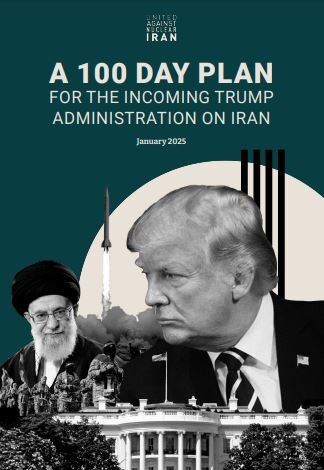Zionists call for military and destabilizing measures against Iran in Trump’s first 100 days

TEHRAN – An anti-Iran group based in the United States with close ties to pro-Israeli lobbies says it has turned in a comprehensive plan of aggressive measures to incoming U.S. President Donald Trump – a plan that the group says will force Iran into submission.
The recommendations published on the United Against Nuclear Iran’s websites seem to advocate a stricter continuation of the so-called maximum pressure campaign Trump adopted during his first term in office which lasted from 2017 to 2021.
What the UANI hopes Trump would do
The anti-Iran group’s plan is characterized by broad sanctions, military threats, and efforts to destabilize Iran. Here's a breakdown of all UANI recommendations for Trump’s 100 days in office:
Escalatory military threats: The UANI calls for a clear U.S. policy of military intervention against Iran's nuclear program and retaliation for Resistance groups’ operations against illegal American bases in West Asia.
Even more sanctions: The Zionist entity calls for a total embargo on Iranian oil, coupled with secondary sanctions on those who continue to purchase it (including China).
Undermining diplomacy: The UANI plan essentially dismisses any potential for diplomatic engagement. By calling for the dismantling of the Iran nuclear deal and immediate invocation of the UN snapback mechanism, the plan asks to close the door on any future negotiations.
Domestic destabilization: Certain recommendations suggest that the U.S. should capitalize on public anger over economic and social conditions in Iran, many of which are attributed to U.S. sanctions, to deliberately instigate widespread chaos and instability.
Regional destabilization: The UANI plan also recommends intensifying regional instability by increasing the likelihood of conflicts and further empowering Israel. Aggressive actions, such as targeting Ansarullah leaders and increasing weapons shipments to Arab partners, are some of those suggestions.
Propaganda campaigns: Consistent with its agenda to undermine internal stability in Iran, the group urges Trump to escalate the use of propaganda channels to sow division among the Iranian people, fuel widespread mistrust, and deliberately provoke domestic hostility and violence.
Why the UANI will have to keep hoping
The recently proposed plan offers little in the way of genuinely new solutions. They are actions that Washington has either historically struggled to implement or has consciously avoided.
Take, for example, the issue of sanctions. Both the first Trump administration and the succeeding Biden one aggressively pursued a policy aimed at reducing Iran’s oil exports to zero. Despite these efforts, Iran successfully circumvented sanctions, albeit at the cost of selling oil at a reduced price. The current proposal suggests sanctioning all purchasers of Iranian oil. However, given that China is the largest importer of Iranian crude, the question arises: does the U.S. truly possess the means to effectively compel China to halt these purchases? The geopolitical reality suggests a negative answer.
Furthermore, the idea of “regime change” through funding internal unrest within Iran is another strategy with a long and demonstrably poor track record. The West has repeatedly attempted this approach over the past four decades, with consistent failure. There's little reason to believe that it will prove any more successful this time around.
This leaves one option that Washington has historically refrained from pursuing: a direct military strike against Iran's nuclear facilities. This hesitancy is not rooted in a concern for the potential civilian casualties but stems from the awareness of the catastrophic consequences. An attack on Iran's nuclear sites would almost certainly trigger a shift in Iranian nuclear doctrine, and push the country to develop nuclear weapons. Similarly, any military attack on Iranian military installations risks a devastating retaliatory response, given the broad range and capabilities of Iran's missile and drone arsenal, which can target numerous American bases throughout the region and beyond.
Leave a Comment